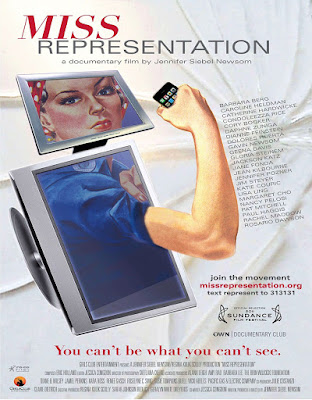
Miss
Representation is a documentary film that premiered at the Sundance Film
Festival in 2011. It was shown on US television (OWN) and released on DVD in
2012. Here is some basic information about it:
** Written,
produced and directed by Jennifer Siebel Newsom
** Run time: 85
minutes
Several witnesses
were interviewed for the film, but the list of names is too long to be included
here. I will mention only one of them: Barbara J. Berg, whose book Sexism in
America (2009) covers the same issue as the film.
Miss
Representation shows how US women are under-represented in places of power: few
women are leaders or owners of large companies; few women are governors of a US
state; few women are members of Congress; and no woman has ever been elected as
president of the US.
This film got some
good reviews: on IMDb it has a rating of 77 per cent, which corresponds to four
stars on Amazon. I understand the positive reviews and I agree with them.
However, I also understand why the average rating does not go higher than this.
Miss
Representation gives a good description of the current situation in the US
regarding gender relations, but there is no analysis here. Some important
questions are never raised and therefore never answered; this means some important
aspects are never explored.
Question # 1: How
did we get here? How did men manage to capture such a large share of power,
money, and opportunities? Why did women allow this to happen?
Question # 2: If
we do not like what we see, what can be done to change the current situation to
something better? How can power, money, and opportunities be shared more
equally by men and women?
Question # 3: Some
women of the world have reached powerful positions when they became president
or prime minister of their country. Did these women make a difference? Did they
make the world a better place for other women? Were they better and more honest
leaders than the men who had held these posts before them?
The answer is no.
In fact, they were often worse than the typical male politician. In order to
get where they wanted to go they had to be worse - more ruthless - than their
male rivals. Just think about Margaret Thatcher, who was prime minister of the
United Kingdom for several years. Did she work for equal representation of men
and women? Hardly. Was gender equality an important item on her agenda? Not
exactly.
Miss
Representation laments the fact that women are under-represented in Congress
and that the US has never had a female president. Let us assume 50 per cent of
the members of Congress were women. Let us assume the US had a female
president. Would this fact really change the laws of Congress or the policies
of government in any significant way?
I am afraid the
answer to this question is no. Women often vote the same way as their fathers
or their husbands, so even if there are many women in parliament or in
government, this is no guarantee that we will see any real and significant
improvement of the current situation.
I realise that
what I have said in relation to question # 3 is a taboo, i.e. something that is
not supposed to be said. But the discussion about gender relations has to be
honest and open. Otherwise there can be no real change, no real improvement of
the current situation.
While women of the
US have many complaints, which are fully justified, they should be happy that
they are living in the US and not in a country such as India, China or Vietnam
where gender selection before birth is widespread. If a women in one of these
countries is pregnant with a girl, she is often forced to get an abortion,
because most men want to have a son and they do not wish to be the father of a
daughter. A daughter is considered a tragedy!
Gender selection before
birth is a horrible practice. While it is usually illegal, the law is not
enforced by the authorities, perhaps because most male leaders of these
countries cannot understand that it is wrong.
Miss
Representation is an interesting film, but as you can see, it has a
significant flaw, which I cannot ignore. I like this film and I want to give it
a good rating, but I have to remove one star because of this flaw. Therefore I
think it deserves a rating of four stars.
PS. For more
information about gender relations in the US and the rest of the world, see the
following films:
** America the
Beautiful (2010)
** Half the Sky (2012)
** Girl Rising
(2013)
** It’s a Girl (2013)
*****
No comments:
Post a Comment